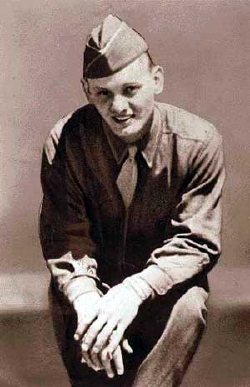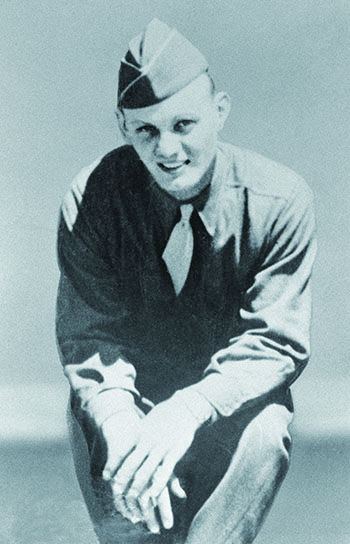 After enduring one night of heavy shelling on his way to the Battle of Hürtgen Forest, Private Eddie Slovik decided he preferred prison to the front lines, and turned himself in as a deserter on October 9, 1944. Confident of the punishment he would receive, Slovik repeatedly refused opportunities to destroy his confession and return to combat with the 28th Infantry Division. But the military tribunal, acutely aware of the increasingly dire combat situation, ruled unanimously for the death penalty—“To maintain that discipline upon which alone an army can succeed against the enemy.” Hoping for clemency, Slovik wrote a letter on December 9, 1944, pleading his case directly to the supreme Allied commander, General Dwight D. Eisenhower.
After enduring one night of heavy shelling on his way to the Battle of Hürtgen Forest, Private Eddie Slovik decided he preferred prison to the front lines, and turned himself in as a deserter on October 9, 1944. Confident of the punishment he would receive, Slovik repeatedly refused opportunities to destroy his confession and return to combat with the 28th Infantry Division. But the military tribunal, acutely aware of the increasingly dire combat situation, ruled unanimously for the death penalty—“To maintain that discipline upon which alone an army can succeed against the enemy.” Hoping for clemency, Slovik wrote a letter on December 9, 1944, pleading his case directly to the supreme Allied commander, General Dwight D. Eisenhower.
Dear Sir,
I Private Eddie D. Slovik A.S.N. #36896415 was convicted the 11th day of November year 1944 Armistice Day by General Court Martial to be shot to death for desertion of the United States Army.
Dear Sir,
The time of my conviction or before my conviction I had no intentions of deserting the Army whatsoever. For if I intended too I wouldn’t have given or surrendered myself as I did. I have nothing against the United States Army whatsoever. I merely wanted a transfer from the line. I asked my C.O. when I came back if their was a possible chance of my being transfered cause I feared hazardous duty to to myself, and because of my nerves. I’ll admit I have some awful bad nerves, which no doubt in my mind we all have. I was refused this transfer.
Dear Sir,
I must tell you more about my past. I assume you have my records of my past criminall life in my younger stage of life. After being released from jail I was put on a two year parole after spending five years in jail. In them two years that I was on parole I got myself a good job. Cause I was in class 4F the Army didn’t want anything to do with me at the time. So after five months out of jail I decided to get married which I did. I have a swell wife now and a good home.
After being married almost a year and a half I learned to stay away from bad company which was the cause of my being in jail. Then the draft came. I didn’t have to come to the Army when they called me. I could of went back to jail. But I was sick of being locked up all my life so I came to the Army. When I went down to the draft board, I was told that the only reason they were taking a chance on me in the Army was cause I got married, and had a good record after being out of jail almost two years. To my knowledge sir I have a good record in the past two years, I also have a good record as a soldier up to the time I got in this trouble. I tried my best to do what the army wanted me to do till I first ran away or should I say left the company.
Dear Sir,
I don’t believe I ran away the first time as I stated in my first confession. I came over to France as a replacement, and when the enemy started to shelling us I got scared and nervous that I couldn’t move out of my fox hole. I guess I never did give myself the chance to get over my first fear of shelling. The next day their wasn’t any American troops around so I turned myself over to the Canadian M.P.’s. They in turn were trying to get in touch with my outfit about me. I guess it must have taken them six weeks to catch up the American troops. Well sir, when I was turned over to my outfit I tried to explain to my C.O. just what took place, and what had happened to me. Then I asked for a transfer. Which was refused. Then I wrote my confession. I was then told that if I would go back on the line they would distroy my confession, however if I refused to go back on the line they would half to hold it against me which they did.
Dear Sir,
How can I tell you how humbley sorry I am for the sins I’ve comitted. I didn’t realize at the time what I was doing, or what the word desertion meant. What it is like to be condemned to die. I beg of you deeply and sincerely for the sake of my dear wife and mother back home to have mercy on me. to my knowledge I have a good record since my marriage and as a soldier. I’d like to continue to be a good soldier.
Anxiously awaiting your reply, which I earnestly pray is favorable. God bless you and in your work to victory.
I remain yours for victory,
Pvt. Eddie D. Slovik
Eisenhower confirmed the sentence on December 29, during the Battle of the Bulge, meaning Slovik would become the first and only American soldier to be officially executed for desertion since the Civil War.
As Slovik prepared for the firing squad on the morning of January 31, 1945, he said: “They’re not shooting me for deserting the United States Army, thousands of guys have done that. They just need to make an example out of somebody and I’m it because I’m an ex-con…. They’re shooting me for the bread and chewing gum I stole when I was 12 years old.” Though Slovik’s criminal record was a factor in the decision, Major General Norman D. Cota, commander of the 28th, made clear the reason for his verdict: “If I had let Slovik accomplish his purpose, I don’t know how I could have gone up to the line and looked a good soldier in the face.”





